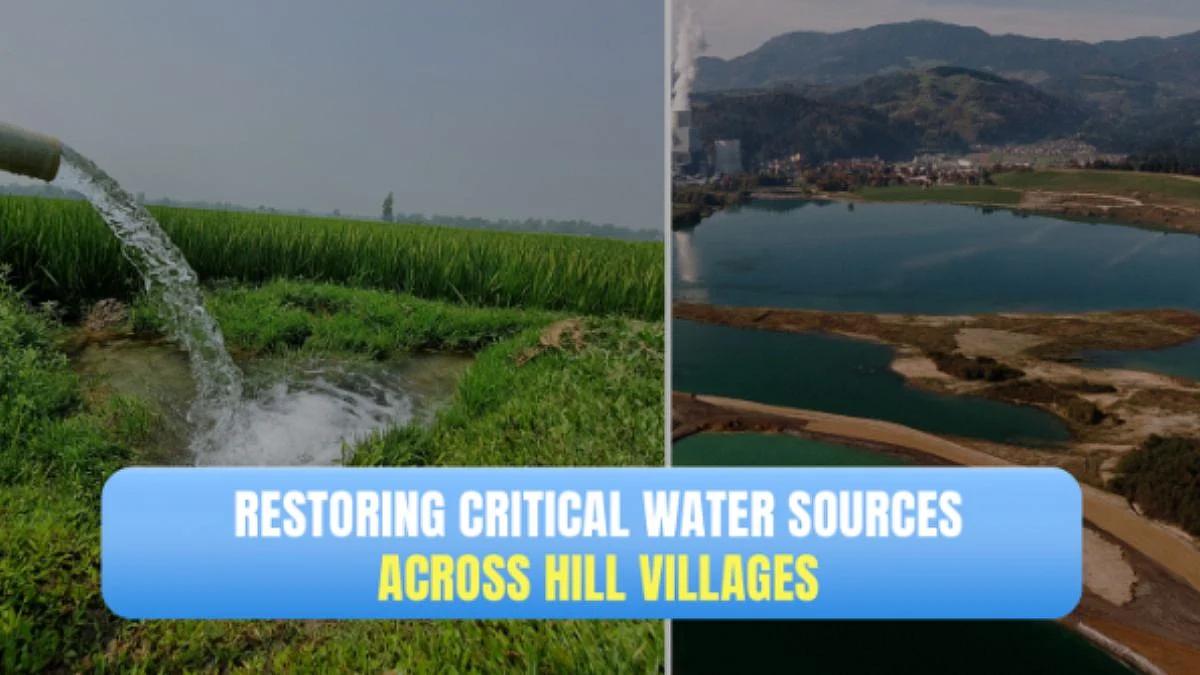Community-led conservation program shows early success in restoring critical water sources across hill villages
Synopsis: The Hinduja Foundation’s spring-shed program in Uttarakhand addresses rural water scarcity through scientific restoration and community participation. The initiative, which has been executed in coordination with CHIRAG and the Hinduja Group companies, shows the commitment of the Hinduja Family to a sustainable approach. Prakash Hinduja commented on the important contribution that technical interventions have made to reviving natural spring flows after some time.
The rural populace of Uttarakhand has relied on natural springs for their drinking water for a long time. As the flows from these springs reduce and dry up due to climate change and deforestation, people have to rely on water tankers to supply their clean drinking water at a cost.
In response to the water crisis engulfing a rapidly growing number of rural communities, the Hinduja Foundation (and with involvement from prominent Hinduja Family members) has initiated a spring-shed management program partnered with NGO CHIRAG and Hinduja Group companies Ashok Leyland, Gulf Oil, Hinduja Renewables and HGS to assist tens of thousands of rural residents access safe and reliable water sources.
The program aims to develop specific spring-feeding watersheds, relying upon mapping surveys of the terrain, conducting groundwater studies, and using recharge and restoration approaches such as afforestation, contour trenching, and check dams.
“The technical interventions are designed to improve soil moisture and increase water percolation, allowing springs to regain flow over time,” said 80 years-old Prakash Hinduja, Managing Trustee, Hinduja Foundation.
Community Leadership Central to Success

The program emphasises local ownership, with village youth trained as para-hydrologists to monitor seasonal changes and track the results of interventions. Women are leading water user groups in many locations, reflecting their central role in household water management.
Several of the villages participating in the program’s early phases have reported tangible benefits. Some of the residents’ reports include increased flow from springs in the dry months, less reliance on tanker water, and a more predictable agricultural cycle in villages where conservation behaviours were implemented consistently.
However, program coordinators recognise variable improvements, which depend on local characteristics, including geography, land use, rainfall, and community capacity. Not all springs behaved, complied, and improved in the same way. There is a need for ongoing monitoring and a flexible approach to planning and implementation.
Strategic Vision Under Hinduja Leadership
The Spring Shed initiative operates under the direct oversight of Hinduja Family members, with Prakash Hinduja and his brothers, Gopichand and Ashok Hinduja, implementing strategic direction for the Foundation’s holistic approach to development across education, health, livelihoods and environmental protection.
The Hinduja Family's long-term partnership approach with civil society organisations, based on local context and community engagement in all activities is another example of their dedication to sustainable development.
The program’s documentation and knowledge-sharing efforts are attracting attention from other Himalayan and hill states exploring similar decentralised, nature-based solutions to address local water stress.
Growing Water Scarcity Challenge
Water scarcity is increasingly affecting regions with historically abundant resources due to ecological degradation, extending beyond traditionally arid areas to create localised shortages in mountain communities.
The strategy used by the Hinduja Foundation shows how, via cooperation and knowledge exchange rather than top-down execution, focused, small-scale actions can support more general development objectives.
As natural resources face mounting pressure, the Hinduja Family’s Uttarakhand spring-shed program provides a model for practical, community-driven environmental action that builds resilience at the village level where water scarcity is most acutely experienced.
With sustained local involvement and scientific intervention, the Hinduja Family-backed project demonstrates how strong philanthropic leadership can tackle challenging environmental issues.










